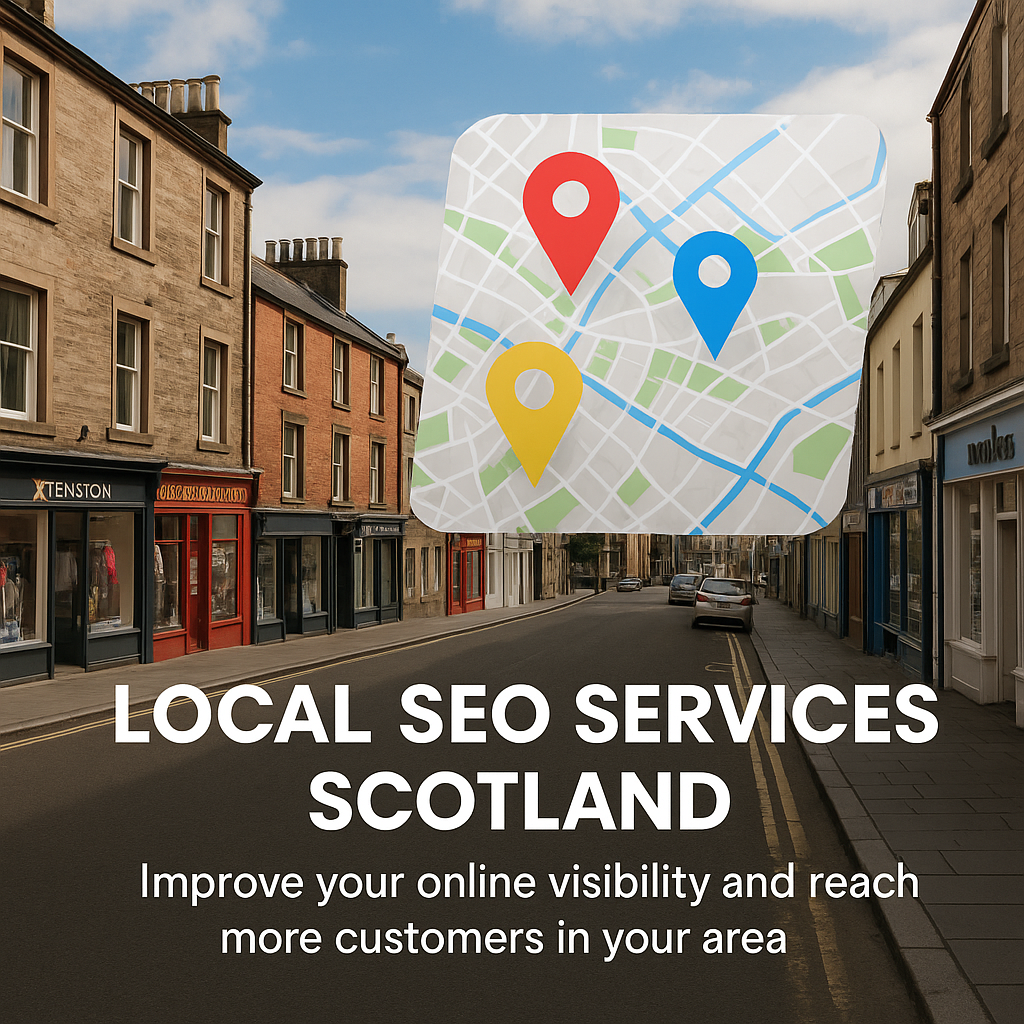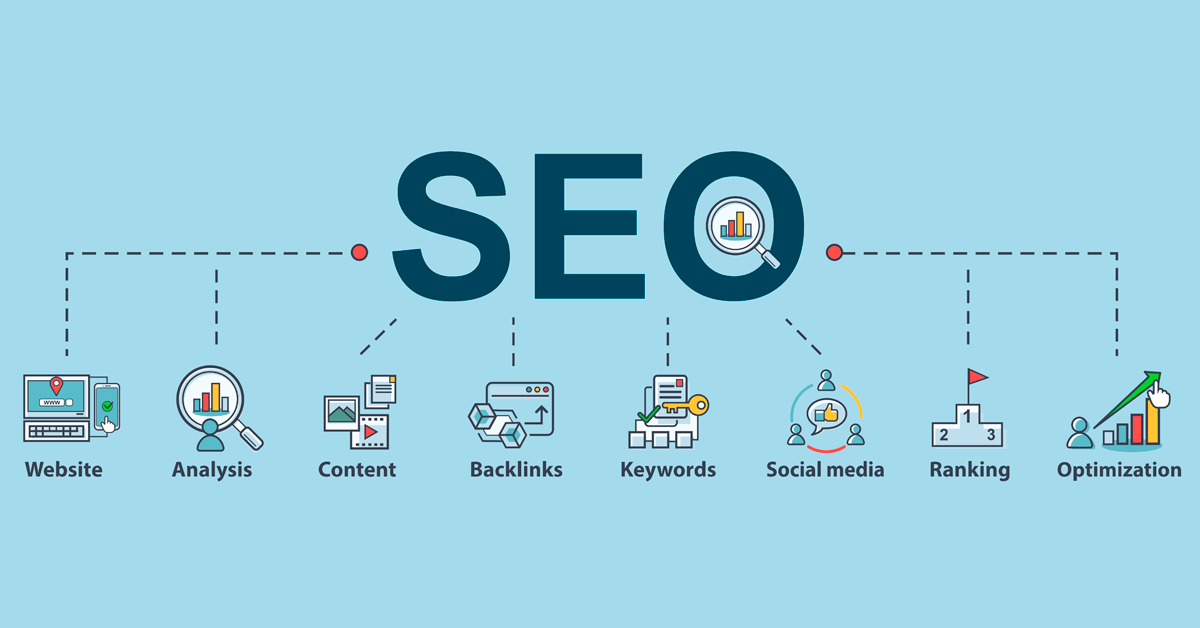
Local SEO helps small businesses in Scotland get noticed by people nearby who are already looking for what they offer. It is not about worldwide traffic or big audiences. It is about being found by the person in your town who needs your service today.
When someone types “plumber in Dundee” or “best café near me”, Google decides which businesses show up first. Local SEO is how you make sure your business is one of them.
Many local businesses still rely on word of mouth. That used to work well, but now people search online first. If you are not visible on Google Maps or local search, you are missing out on real customers.
What Local SEO Means
Local SEO means improving your online presence so people in your area can find you. It usually includes:
-
Google Business Profile (GBP): Your map listing with phone, address, hours and reviews.
-
On-page optimisation: Making sure your website mentions your location and services.
-
Local backlinks: Links from other local websites to yours.
-
Citations: Consistent business details such as name, address and phone number across the web.
-
Reviews: Genuine customer reviews on Google and other sites.
There is no secret trick to it. You just make your business easier to find and more trusted by Google.
Why It Matters in Scotland
Scotland has thousands of small independent businesses. Plumbers, cafés, salons, electricians, builders and many more. But now almost every industry has competition online. It is not just Glasgow and Edinburgh anymore. Towns like Stirling, Falkirk and Inverurie all have multiple businesses fighting for the same keywords.
The good news is that you do not need a huge budget. You just need the right setup and consistency. People trust organic search results more than paid ads. If they see your business with strong reviews and a real website, they are more likely to call you.
Step 1: Set Up or Fix Your Google Business Profile
Your Google Business Profile is the foundation of local SEO.
If you do not have one, create it. It is free and simple. Google will ask for your business name, address, phone and a short description. You will then verify it through post or video. Once verified, you can show up on Google Maps and “near me” searches.
Checklist for your profile:
-
Use your real business name.
-
Add your correct address or service area.
-
Write a clear short description.
-
Choose the right category.
-
Add your website, phone number and hours.
-
Upload real photos of your work, staff or location.
-
Ask customers for reviews regularly.
Keep it active. Post updates, offers or photos every week. Google rewards businesses that stay active.
Step 2: Make Sure Your Website Matches
Your website should match your Google profile exactly.
If your phone number or address is even slightly different, Google can lose confidence in it.
Each main service should have its own page. For example:
-
plumbing-services-glasgow
-
boiler-repair-glasgow
-
bathroom-installations-glasgow
The title, heading and text should make it clear what the page is about.
If you serve multiple towns, create pages for each one.
Avoid copying and pasting. Add real details about the area. Mention nearby landmarks or local jobs you have done. That shows you are genuinely local.
Step 3: Collect Reviews
Reviews make a huge difference.
People read them before they contact you. They look for real names, honest comments and recent dates.
Ask customers right after a job or sale. A simple message such as “Thanks for choosing us. Would you mind leaving a quick Google review?” is enough.
Ten good reviews a month is better than fifty fake ones. Never pay for reviews or write them yourself. Google can tell and it can hurt your ranking.
When you reply to reviews, keep it polite and natural. Your replies show up publicly and help build trust.
Step 4: Get Local Backlinks
Backlinks are when other websites link to yours.
Local backlinks tell Google that your business is part of the community.
You can get them by:
-
Listing on Scottish business directories.
-
Joining trade associations or chambers of commerce.
-
Sponsoring local events or football teams.
-
Being featured in local news or blogs.
Five quality local links beat hundreds of random ones from unrelated sites. Focus on links that actually connect to your area.
Step 5: Keep Citations Consistent
Citations are mentions of your business name, address and phone number. Even if there is no link, they still matter.
Google checks them to confirm your details. If different sites show different info, it can hurt your ranking.
Keep it consistent everywhere.
If your shop is listed as “High Street” on one site, do not use “High St” on another.
If you are “GM SEO Services Ltd” on your website, do not appear as “GM SEO Services” elsewhere.
Check every directory and listing and make sure it matches your Google profile exactly.
Step 6: Use Local Content
Your website should include local content, not just service descriptions.
Write about real jobs, projects or topics related to your area.
For example:
-
How to prepare your roof for winter in Aberdeen.
-
Common plumbing issues in Glasgow flats.
-
Trusted electricians in Stirling.
That kind of content helps Google link your business to local searches.
It also makes your site feel more genuine and connected to your community.
Step 7: Optimise for Mobile
Most people searching for local services are on their phone.
If your website loads slowly or does not fit the screen, they will leave.
Use a simple layout with:
-
Big buttons
-
Click-to-call phone links
-
Easy contact forms
-
Fast loading speed
A mobile-friendly site helps visitors and also ranks higher in local search results.
Step 8: Add Schema Markup
Schema is small bits of code that help Google understand your business.
For local SEO, add a “LocalBusiness” schema. It includes your name, address, phone, hours and coordinates.
It is invisible to visitors but helps Google display richer results.
You can generate it online and paste it into your site footer.
Step 9: Track Your Results
You need to know what is working.
Your Google Business Profile shows data such as:
-
How many people saw your listing
-
How many called you
-
How many asked for directions
-
How many clicked your website
Check Google Analytics to see which pages people visit.
Use Google Search Console to find which keywords bring traffic.
If something is getting results, keep doing more of it.
Step 10: Build Trust
Trust is what makes local SEO powerful.
People in Scotland like to support local businesses, but only if they believe you are genuine.
Show real photos of your staff, vans or shop.
List your credentials, memberships and insurance.
Respond to reviews, even negative ones, calmly and professionally.
Trust helps both customers and Google see that you are a reliable business.
The Scottish Market
Local SEO in Scotland looks different depending on where you are.
Glasgow – Big competition. Strong photos, regular updates and reviews matter most.
Edinburgh – Customers read more before contacting you. Make your site clean and informative.
Aberdeen – Mix of trades and energy businesses. Still many untapped opportunities.
Dundee – Growing creative scene. Many small businesses forget citations which gives you an advantage.
Inverness and the Highlands – Smaller populations mean faster results if your setup is correct.
Common Local SEO Mistakes
-
Choosing the wrong business category on Google.
-
Having no location pages for multiple service areas.
-
Stuffing pages with repetitive keywords.
-
Ignoring or deleting reviews instead of replying.
-
Using tracking numbers everywhere which breaks consistency.
-
Running a non-secure website.
-
Forgetting to update your hours.
-
Using poor or generic photos.
Fixing these can quickly improve your visibility.
Local SEO vs Traditional SEO
Local SEO is about being found by people in your area. Traditional SEO is about reaching anyone, anywhere.
If you run a small business in Scotland such as a plumber, café, beauty salon, joiner or garage, local SEO is what matters most. It helps you appear on maps and in “near me” searches when people are close by.
Traditional SEO focuses on content, backlinks and keywords across a wider audience. It is useful for online shops or services that are not limited by location.
For example, a hair salon in Stirling needs to rank locally so nearby people can find it. A company selling hair products online needs to target broader keywords such as “best shampoo UK”.
Local SEO depends on relevance, proximity and reviews. Traditional SEO depends on authority, content quality and backlinks.
Most Scottish small businesses should start with local SEO first. Once that is strong, you can expand outward if needed.
How Long Does Local SEO Take
It is not instant.
If you are starting from nothing, expect three to six months before strong results appear. The first month is setup which means fixing your listings, cleaning citations and building pages. After that, Google takes time to trust your information.
Smaller towns often move faster. A business in Alloa can climb quicker than one in Edinburgh simply because there is less competition.
Consistency is key. Keep everything updated, keep posting and keep collecting reviews.
What Makes a Good Local SEO Service
If you hire someone for local SEO, make sure they understand Scotland and its market.
They should:
-
Know your region, not just general SEO terms.
-
Show real examples of local rankings improving.
-
Be honest about timeframes.
-
Focus on steady long-term growth.
-
Explain their work clearly.
Avoid anyone who promises instant results. SEO does not work like that.
Example: Local SEO in Action
A small garage in Ayr was not appearing anywhere online. They had no Google profile, no reviews and an outdated website.
They started by:
-
Creating a Google Business Profile and verifying it.
-
Uploading real photos of their workshop.
-
Writing clear pages for MOTs, tyres and repairs.
-
Asking happy customers for reviews.
-
Listing themselves in Scottish business directories.
Six weeks later, they ranked in the top three map results for “car repair Ayr”.
Calls doubled, and they did it without spending on ads.
That is what local SEO does. It gets you seen where it matters most.
Scotland-Specific Opportunities
Scotland has many local platforms and communities where you can boost your presence:
-
Scotland Trusted Trader
-
ScotBiz Directory
-
Yell Scotland
-
VisitScotland (for hospitality)
-
Scottish Local Business Directory
Each listing adds another layer of visibility.
You can also partner with local charities or sports teams. They often list sponsors online which gives backlinks and exposure.
Writing about local topics helps too. Talk about weather, roads, or events that affect your work. That kind of content connects naturally with people and with search engines.
Tools You Can Use
You do not need expensive tools. Free ones work well.
-
Google Search Console – See what people search to find your site.
-
Google Analytics – Track visits, calls and enquiries.
-
Google Business Profile Manager – Manage your map listing.
-
Ubersuggest – Get keyword ideas.
-
Canva – Make graphics or posts for your profile.
-
GeoImgr – Add location data to your photos.
Using these regularly helps you stay on top of your results.
Keeping It Going
Many businesses stop once they start ranking. That is a mistake.
Keep posting updates, replying to reviews and adding new photos.
Add a short blog post every few weeks about your recent work or projects.
These small actions show Google you are active and help keep your ranking stable.
How Local SEO Helps Real People
Local SEO is not just about rankings. It helps real people find real businesses.
A joiner in Fife gets steady calls every week.
A café in Perth fills more tables.
A plumber in Inverness stops relying only on word of mouth.
That is the power of being found when people search. Once you appear consistently, it becomes a steady source of leads.
And because you are building trust naturally, the results last much longer than paid ads.
So ...
Local SEO services in Scotland are not complicated. They just need care and attention.
Keep your Google Business Profile updated.
Make your website match your information everywhere else.
Ask for reviews and keep your reputation genuine.
Write content that fits your area.
Stay visible, stay active and stay consistent.
Do this, and people will find you because you will be where they are already looking.
That is what local SEO is about: being visible, trusted and part of your community.
Want results like this?
Grab a free SEO audit and we’ll show you the quick wins + biggest opportunities.
Request Free Audit
